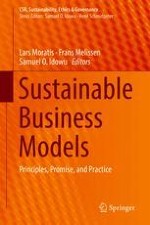2018 | OriginalPaper | Buchkapitel
7. Creating Integrated Value Through Sustainable Innovation: A Conceptual Framework
verfasst von : Wayne Visser
Erschienen in: Sustainable Business Models
Aktivieren Sie unsere intelligente Suche, um passende Fachinhalte oder Patente zu finden.
Wählen Sie Textabschnitte aus um mit Künstlicher Intelligenz passenden Patente zu finden. powered by
Markieren Sie Textabschnitte, um KI-gestützt weitere passende Inhalte zu finden. powered by
